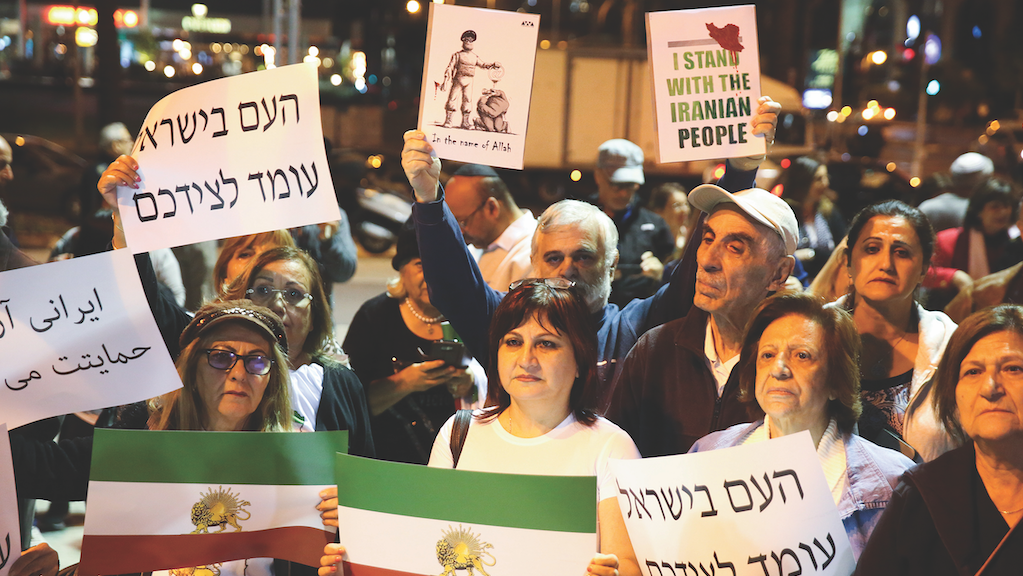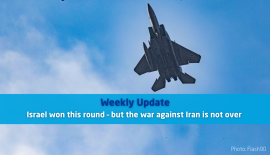Iran and Israel Closer to an all-out-war
Certain developments are going on in Iran’s largely covert war against Israel that are largely hidden from the public. The developments make it clear that a military confrontation between Israel and Iran seems inevitable in the long run. Also, the United States is now more aware of the fact that under no circumstances should Iran obtain a nuclear weapon.
The current US administration now seems more open to paying attention to Iran’s bellicose activities in the Middle East. Until recently, it seemed that President Biden’s administration focused exclusively on ‘nuclear programme. According to Prime Minister Bennett’s statement after his meeting with Biden in late August, this now seems to have changed.
In the presence of Biden, Bennett said that Iran is the world’s biggest exporter of terror. He also said that he had discussed his plan of action against Iranian aggression in the region with the US President. Bennett said that this aggression must be stopped and added that Israel is now virtually surrounded by allies of Iran. These are the Palestinian terror movements in Gaza, Hezbollah in Lebanon, and Shiite militias in the Golan Heights that are armed and supported by Iran.
Israeli military and security experts had held extensive discussions with Biden prior to Bennett’s official visit about Iran’s aggressive activities in the Middle East. These experts also discussed the growing threat that Iran poses to Israel’s survival.
Iran’s Military Advance
Ehud Yari is one of the most experienced TV commentators in the Middle East. At the beginning of September, he revealed that Iran and Hezbollah, despite repeated Israeli military action, have managed to control the Syrian Golan Heights. In fact, Iran is now handing out orders to the Syrian army.
Since June, an Iranian-led offensive against Sunni rebels in the Dara district bordering the Syrian Golan Heights. The city of Dara was under siege until the rebels had to accept a humiliating cease-fire that didn’t last for a long time.
The uprising against the regime of Syrian dictator Bashar al-Assad began in 2011 in the city of Dara. The rebels there never gave up their resistance against the Bashar regime and the Quds Force of the Islamic Revolutionary Guards Corps ( IRGC). The resistance against Assad and Iran also continued when the Syrian army returned to the south in the summer of 2018.
In principle, the Russian army in Syria should have stopped Iran’s advance. However, in practice, the agreements between the Assad regime, Russia, and the rebels turned out not to be worth the paper they were written on.
King Abdullah II Worried
Abdullah II, the king of Jordan, is seriously concerned about the activities of the Iranian coalition on the Golan Heights.
Abdullah, therefore recently travelled to President Putin for urgent consultations with the Russian leader in Moscow. Abdullah would like to restore relations with the Assad regime to gain more influence over what is happening along Syria’s border with Jordan. Under no circumstances does the King of Jordan want the IRGC and Hezbollah to have a foothold along the kingdom’s border. The king knows that the IRGC’s Quds Brigade commands the fourth and seventh divisions of the Syrian army. The same applies to the supreme command of that army.
Iran, together with Hezbollah, has succeeded in controlling the Syrian Golan Heights and is now handing out orders to the Syrian army there.
So far, the Iranians have refrained from a massive military build-up on the Golan Heights. They have limited themselves to flying in unmanned aerial vehicles (UAVs) and setting up look-outs and intelligence facilities along the border with Israel. However, Yari expects the next phase to begin once the main road to the city of Dara’a is fully in the hands of the IRGC and the Syrian army. That phase will be when the Iranian axis completely takes over the border area with Israel and Jordan.
Israel’s Dilemma
Israel has a dilemma here. It has an agreement with Syria regarding the demilitarised zone on the Golan Heights that dates back to 1974 and was reaffirmed by both sides in 2018 after the Syrian army regained control over the Golan Heights.
The agreement provided quiet until 2015, but then Iran began its drive to use the Syrian war for its grand scheme of establishing the ‘Golan Liberation Brigade’ and began to heat up the Syrian Israeli border. This was done by launching mortar shells and rockets at the Israeli Golan Heights and, later, by sending armed UAVs into Israel. The latest Iranian ‘suicide drone’ was sent into Israel during the eleven-day war between the Palestinian terror groups in Gaza and the Israeli military last May.
Despite the reaffirmed ceasefire agreement, Israel’s military repeatedly took preventative action over the past three years to prevent Iran and its proxies from setting up camp on the other side of the border on the Golan Heights. To this end, the Israeli air force (IAF) repeatedly bombed Hezbollah positions and the look-outs used by the Lebanese terror organisation to spy on the Israeli army.
However, this didn’t prevent Iran from slowly taking over the Syrian Golan Heights. The latest news by Israeli media like N12 (20 September) is that Syrian dictator Bashar al-Assad has given Iran the green light to take over the area along the Israeli border completely.
If Hezbollah and the Quds Force start the military build-up on the Syrian Golan Heights, Israel will have to take military action and could launch a ground offensive.
In that case, the Americans will not intervene, nor will the Russians, although the Russian army could frustrate such an offensive.
Bennett made it clear in Washington that Israel wants the full support of the Biden administration in its ‘war between the wars’ against Iran. However, he also made it unequivocally clear that Israel does not expect US military intervention if it decides to take military action against Iranian aggression.
Ten Ships with Weapons
For years, Iran has been arming the terrorist groups that threaten Israel. Iran also trains them in producing missiles and UAVs. These groups include the various Shiite militias in Syria and the Palestinian terror groups Hamas and Palestinian Islamic Jihad (PIJ).
This was once again confirmed by Talal Naji, the Secretary-General of the central command of the Popular Front for the Liberation of Palestine (PLFP). Naji gave an interview to the Iranian TV station Al- Alam on 11 August this year and said that Qassem Soleimani had sent ten ships with weapons to the Palestinian terrorist movements. Soleimani was the commander of the Quds Brigade of the IRGC until he was assassinated by the US army in the Middle East on 5 January 2020.
Only one ship sent by Soleimani, the Karina A, was intercepted by the Israeli Navy. The weapons it was carrying were destined for Arafat’s Fatah movement.
Israel then launched a media campaign to convince the world community that the PLO leader had never intended to pursue peace after signing the Oslo accords. However, the campaign made no impression. The other ships with weapons reached Lebanon, and from there, the weapons were shipped to Hamas in Gaza, Naji said.
Soleimani and Hamas
The Palestinian rocket and weapons industry was developed on Soleimani’s orders in cooperation with ‘the brothers in Syria’. The military training needed to use the weapons was also given in Iran, Syria, and Lebanon. Soleimani oversaw the whole operation and ordered the Palestinian terrorist movements to be able to produce weapons and rockets independently. The weapons and rockets that Soleimani sent to Gaza were packed in waterproof containers and thrown into the sea. Soleimani worked closely with Hezbollah leader Hassan Nasrallah and also arranged for the anti-tank missile to be made available to Hamas. This was used in the more recent wars against Israel.
Iranian Warships
Iran has also converted commercial ships into warships, which are now used to patrol the Mediterranean. The two large vessels carry helicopters, UAVs, and speedboats that the IRG also used to carry out attacks and piracy against Western nations and Israel ships.
According to Lenny Ben-David, the two ships were most recently spotted in the Strait of Gibraltar, where they were escorted in dense fog by Russian warships. Ben- David is a retired Israeli diplomat and researcher for the pro-Israel American lobby organisation AIPAC and The Jerusalem Center for Public Affairs (JCPA).
Iran’s Nuclear Programme
Then there is Iran’s nuclear weapons programme that is advancing steadily. Since the talks with the Biden Administration about a revised nuclear agreement with the Islamic Republic stalled in June, Iran has made significant progress in its drive to produce a nuclear warhead for its long-range ballistic missiles. The Iranians stopped cooperating with the International Atomic Energy Agency in Vienna and are enriching uranium hexafluoride up to 60% now. The Iranians did this by breaching the 2015 landmark nuclear deal with six world powers and installed hundreds of advanced centrifuges in their nuclear facilities. The Iranians now also produce uranium metal, the material needed to make the core of a nuclear warhead. Producing uranium metal makes no sense if your nuclear programme is for civil purposes only, as Iran claims all the time. The Iranian Foreign Ministry announced at the end of September that the negotiations about the nuclear deal would be resumed within weeks. This must be regarded, however, as another ploy to buy time and nothing else.
Since Iran’s new extremist president Ibrahim Raisi came into office at the beginning of August, expectations about a restart of the negotiations between the US and Iran have hit a snag. Raisi, like Iran’s Supreme Leader Ayatollah Ali Khamenei, is not in favour of returning to the Joint Comprehensive Plan of Action, the official name of the nuclear accord.
Meanwhile, Israel continues to warn the world community that Iran is a little more than a half-year away from developing the nuclear warhead. We are not talking about enriching uranium up to 90%, something that will be the first step to producing the bomb. After that, it will take another half year to finish the process of assembling a nuclear warhead, according to Israeli experts.
Israel will retain its right to do whatever is needed to prevent Iran from producing a nuclear weapon and has warned that it will act alone if necessary. This doesn’t necessarily mean that Israel will launch airstrikes on Iran’s nuclear facilities. Through its spy agency Mossad, the Jewish state has already proven that it uses other means to frustrate the Iranian nuclear weapons programme.
The past year, Mossad assassinated the head of this programme via a remote-controlled Belgium rifle that was assembled on a truck and launched cyberattacks that destroyed parts of Iran’s nuclear facilities.
All this makes it clear that Iran is working hard on its plan to wipe Israel off the map and establish a second Persian empire and that Israel will do whatever is necessary to prevent this evil Iranian plan.






